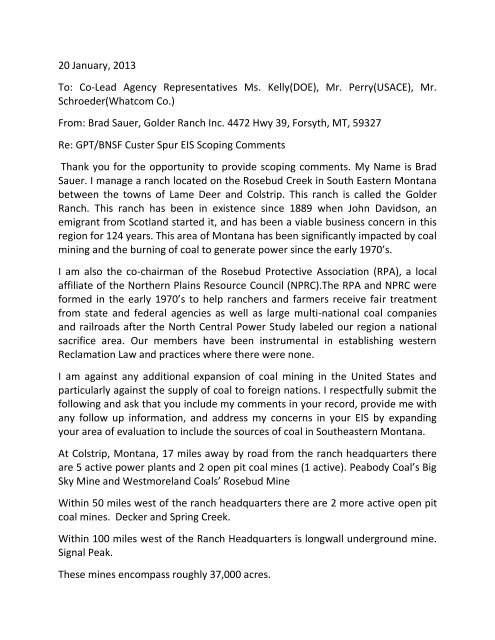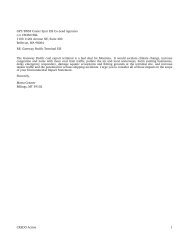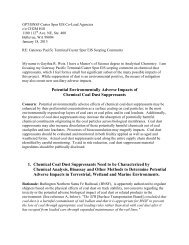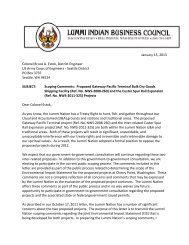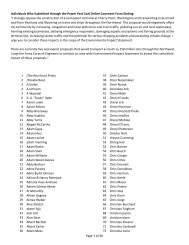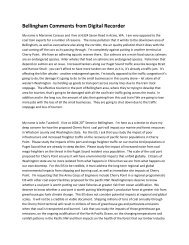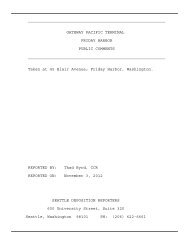Brad Sauer GPT EIS SC 1 20 13.pdf - Scoping Comments
Brad Sauer GPT EIS SC 1 20 13.pdf - Scoping Comments
Brad Sauer GPT EIS SC 1 20 13.pdf - Scoping Comments
Create successful ePaper yourself
Turn your PDF publications into a flip-book with our unique Google optimized e-Paper software.
<strong>20</strong> January, <strong>20</strong>13<br />
To: Co-Lead Agency Representatives Ms. Kelly(DOE), Mr. Perry(USACE), Mr.<br />
Schroeder(Whatcom Co.)<br />
From: <strong>Brad</strong> <strong>Sauer</strong>, Golder Ranch Inc. 4472 Hwy 39, Forsyth, MT, 59327<br />
Re: <strong>GPT</strong>/BNSF Custer Spur <strong>EIS</strong> <strong>Scoping</strong> <strong>Comments</strong><br />
Thank you for the opportunity to provide scoping comments. My Name is <strong>Brad</strong><br />
<strong>Sauer</strong>. I manage a ranch located on the Rosebud Creek in South Eastern Montana<br />
between the towns of Lame Deer and Colstrip. This ranch is called the Golder<br />
Ranch. This ranch has been in existence since 1889 when John Davidson, an<br />
emigrant from Scotland started it, and has been a viable business concern in this<br />
region for 124 years. This area of Montana has been significantly impacted by coal<br />
mining and the burning of coal to generate power since the early 1970’s.<br />
I am also the co-chairman of the Rosebud Protective Association (RPA), a local<br />
affiliate of the Northern Plains Resource Council (NPRC).The RPA and NPRC were<br />
formed in the early 1970’s to help ranchers and farmers receive fair treatment<br />
from state and federal agencies as well as large multi-national coal companies<br />
and railroads after the North Central Power Study labeled our region a national<br />
sacrifice area. Our members have been instrumental in establishing western<br />
Reclamation Law and practices where there were none.<br />
I am against any additional expansion of coal mining in the United States and<br />
particularly against the supply of coal to foreign nations. I respectfully submit the<br />
following and ask that you include my comments in your record, provide me with<br />
any follow up information, and address my concerns in your <strong>EIS</strong> by expanding<br />
your area of evaluation to include the sources of coal in Southeastern Montana.<br />
At Colstrip, Montana, 17 miles away by road from the ranch headquarters there<br />
are 5 active power plants and 2 open pit coal mines (1 active). Peabody Coal’s Big<br />
Sky Mine and Westmoreland Coals’ Rosebud Mine<br />
Within 50 miles west of the ranch headquarters there are 2 more active open pit<br />
coal mines. Decker and Spring Creek.<br />
Within 100 miles west of the Ranch Headquarters is longwall underground mine.<br />
Signal Peak.<br />
These mines encompass roughly 37,000 acres.
Roughly 40 some miles to the South east of the headquarters a new mine, Otter<br />
Creek (Arch Coal) is proposed to mine another 17,000 acres.<br />
To the South in Wyoming within <strong>20</strong>0 miles lie the power plants at Gillette and<br />
more coal mines.<br />
Markets for the coal being mined in this region are declining as much of the coal<br />
here is of low quality (8500 BTU’s) and has high sulpher content. These coal<br />
mines in order to continue operations seem to need to sell coal to the Asian<br />
markets. More coal mining to meet these market demands will threaten and<br />
complicate my livelihood in many ways, but mainly in how increased mining<br />
activity will adversely affect this regions ground water aquifers. Open Pit coal<br />
mines drain shallow groundwater aquifers which provide the water for the use of<br />
our livestock, the regions wildlife, and ourselves as well as various towns in the<br />
region. The coal being mined actually is one of the aquifers. So much damage has<br />
already impacted the ground water in and directly adjacent to the town of<br />
Colstrip that the city no longer uses wells for drinking water but brings water at<br />
great cost through a pipeline 50 miles long from the Yellowstone River. The<br />
ground water that I rely on to sustain life on this ranch is viewed as a waste<br />
product in the nearby coal mines and pumped down gradient. There is so much<br />
waste water around the town of Colstrip that there are over 800 monitoring and<br />
pump-back wells in place to try to deal with it (Montana DEQ information). There<br />
is so much waste water moving downstream from Colstrip, Montana in the<br />
Armells creek drainage that the local ecosystem is being changed from a prairie<br />
riparian area to a toxic wetland where cattle and wildlife often cannot drink the<br />
water unless it is well diluted and regularly tested. There is so much waste water<br />
under the town of Colstrip that many buildings have been torn down due to<br />
buckling and sinking foundations. In fact the floor at the local grocery store slopes<br />
so much that if you let go of your cart, it will roll and sometimes crash into the<br />
shelves.<br />
This is just one of the many impacts that I and my neighbors currently live with<br />
and try to operate our ranches around.<br />
While I am only 1 person and represent only 3 jobs I am a part of the minority 1%<br />
of the United States Population that feeds the rest of the country as well as part<br />
of the world. Plainly put, I raise the food you eat if you eat beef. I also raise some<br />
vegetables for local consumption.
Coal Mining is not a complimentary industry to ranching or other agriculture. The<br />
mining companies are not good neighbors and do not hold up their end of the<br />
local costs their actions incur without duress. They do not willingly help us<br />
suppress range fires, maintain their fences, control noxious weeds, and are often<br />
vindictive when taken to task for not conducting ordinary neighborly landowner<br />
responsibilities. While the coal companies eventually contribute to state and local<br />
tax revenues they often do this under protest. The Railroads do this as a matter of<br />
standard operating procedure. During the construction and development of the<br />
Colstrip area mines and power plants this ranch’s property taxes increased 3<br />
times. These taxes paid for the increased community needs such as law<br />
enforcement, emergency services, and larger schools necessary to accommodate<br />
the increase in the local population from construction workers and miners.<br />
I include all this information because the proposed Otter Creek mine will<br />
contribute coal to be shipped through the proposed port. All of the coal mines in<br />
this area are positioning to be able to ship coal to the ports in the West.<br />
Then there is the issue of reclamation of the open pit coal strip mines. The<br />
Surface Mining and Reclamation Act of 1977 require that all mines post a bond to<br />
cover the costs of reclamation prior to the beginning of mining operations. The<br />
law further requires that the mined area be restored to pre-disturbance or better<br />
conditions which include the ground water aquifers. Of the approximately 37,000<br />
acres that have been stripped to date in Montana only 8,000 have had some<br />
reclamation completed with none of those acres being fully restored to<br />
functioning conditions. In fact at Colstrip, the reclaimed mine lands contain<br />
pockets of bad water which is dangerous to drink for cattle and wildlife. The<br />
bonds placed prior to mining have not been released but neither have they kept<br />
pace with increasing costs of fuel, labor, seed, and other necessities required to<br />
complete the work necessary to become fully functional. Our concern is that the<br />
coal companies will go bankrupt and the reclamation will become the<br />
responsibility of the taxpayers.<br />
The opening of the Otter Creek mine will require the building of a railroad to<br />
transport the coal to a market. The mine developers will not say where the<br />
market is. The proposed railroad to haul this coal has many proposed routes<br />
Various parties have been trying to build this railroad since 1910. This proposed<br />
railroad will willingly threaten to use eminent domain to secure the lands to build<br />
the railroad on. The latest proposed route will pass through the Northern
Cheyenne Reservation, an Amish community (between the house and hay shed of<br />
one Amish family), and the middle of several hundred plus year old ranching<br />
operations. The impacts from this railroad will require many dollars to mitigate<br />
the immediate and continuing interruptions to productive businesses and long<br />
established ways of life. This railroad will also affect how two major drainages<br />
flood, wildlife, human travel, agricultural production, property values, and<br />
property rights. All of this activity will come through your ports to benefit foreign<br />
countries which do not necessarily like the US and multinational corporations<br />
without any guiding principles other than the bottom line of a balance sheet.<br />
Another aspect of impacts which will result from increased coal mining in our area<br />
is the additional time it takes for a rancher who ranches near a coal mine to deal<br />
with the mining company. This is time taken away from regular ranching business.<br />
An example of this is the blasting operations to loosen mine overburden (also<br />
known as soil, rock, and vegetation) and the coal itself prior to the removal of the<br />
coal. State and Federal Law require that blasting only occur on clear days so that<br />
the shock wave from the blast can dissipate upward into the atmosphere. About<br />
10 years ago, the Peabody Big Sky Mine was regularly blasting on overcast days.<br />
The shockwave from the blast would rattle our house which was over 10 miles<br />
from the mine. Who knows what the regular blasting is doing to the water<br />
aquifers. We called the State of Montana to enforce the regulations and things<br />
got better for a while, however residents of Colstrip filed lawsuits against the<br />
mining companies requiring these companies to address damage to residences<br />
from the blasting. I would also add that these are employees of the mines and<br />
power companies. These sorts of things happen regularly enough that I and my<br />
neighbors have to unwillingly incorporate watch dog activities into our workloads<br />
if our ranching operations are to survive. We have been doing so for 40 plus<br />
years. I am of the second generation of ranchers who have had to do participate<br />
in these efforts to safeguard our lands and businesses. Having to take a position<br />
requiring the governments and coal and power companies to adhere to laws and<br />
regulations has also had personal cost in dividing families and local communities. I<br />
am not against the use of coal to generate electricity, as it would be harder to live<br />
without it, but I want to point out that there are many associated costs and<br />
impacts and corporations( who are persons) as well as governments(by and for<br />
the people) are not really the neighbors you want living next door. When you<br />
have a problem with these types of neighbors it is not like their kid hit a baseball<br />
through your kitchen window, it is more like he threw a grenade. You can’t just<br />
walk next door and sit on the step and work it out, you have to hire a couple of
lawyers, spend a lot of money, go to lots of meetings, and use up your precious<br />
time which you could be using to make a living. I also wished to illustrate the<br />
point that the establishment of the new port(s) to handle large amounts of coal<br />
which will come from my neighborhood will have many additional connected and<br />
adverse effects (on top of the impacts already occurring) outside of the proposed<br />
area of the individual ports themselves.<br />
In holding scoping meetings in Spokane, your organizations have essentially<br />
admitted this to be true. I request that you hold additional scoping meetings in<br />
Idaho, Montana, and Wyoming. I also request that you evaluate the new and<br />
cumulative impacts to the states listed above particularly any new coal mine<br />
building or coal mine expansion as well as any new railroad construction in these<br />
states which could provide coal to be shipped through the proposed port(s). I ask<br />
that you incorporate specifically the immediate and cumulative impacts of the<br />
proposed Otter Creek Mine and the Tongue River Railroad into your <strong>EIS</strong>. I<br />
specifically request that you evaluate local, past and current, economic<br />
information relative to your proposed actions and how those actions are likely to<br />
affect local agricultural product markets, property values, taxes, and low income<br />
populations over the next twenty year period in southeast Montana. I also ask<br />
that you evaluate how southeastern Montana agricultural lands and operations in<br />
the mining areas and along the rail routes will be impacted for the entire time the<br />
coal will be shipped to these ports.<br />
In short please review the meanings of the words “Cumulative Impacts” as they<br />
are described in 40 C.F.R., parts 1500 and on of the National Environmental Policy<br />
Act and see if they don’t apply here. My cows aren’t very smart, but they care<br />
about where they live and the water they drink, and so should you.<br />
Sincerely,<br />
<strong>Brad</strong> <strong>Sauer</strong>, Golder Ranch on the Rosebud Creek, Montana


